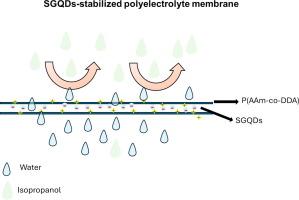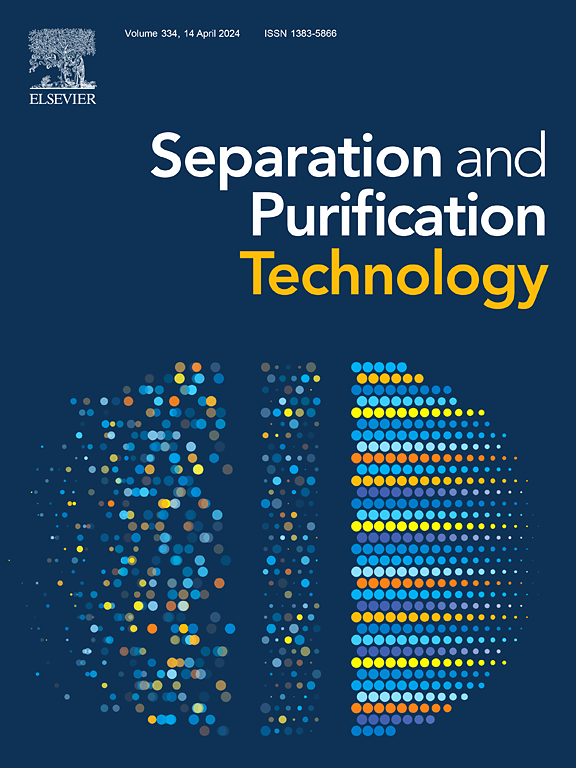Enhanced alcohol dehydration via robust polyelectrolyte membranes embedded with sulfonated graphene quantum dots
IF 8.1
1区 工程技术
Q1 ENGINEERING, CHEMICAL
引用次数: 0
Abstract
This study explored the integration of sulfonated graphene quantum dots (SGQDs) into polyelectrolyte membranes to enhance their stability and pervaporation efficiency. Two cationic polyelectrolytes, poly(acrylamide-co-diallyldimethylammonium chloride) (P(AAm-co-DDA)) and poly(diallyldimethylammonium chloride) (PDDA), were used in conjunction with SGQDs. The number of bilayers was varied to assess their impact on membrane performance. Characterization techniques including attenuated total reflectance Fourier-transform infrared spectroscopy (ATR-FTIR) and x-ray photoelectron spectroscopy (XPS) confirmed the successful integration of SGQDs within the polyelectrolyte membranes. Analyses of water contact angle and zeta potential indicated that the number of bilayers influenced the surface wettability and charge properties of the membranes. Pervaporation tests demonstrated that the SGQDs-P(AAm-co-DDA) system performed optimally at 1.5 bilayers, outperforming the SGQDs-PDDA system. The best-performing membrane achieved a permeation flux of 925 g/m2h and a water concentration in the permeate exceeding 98 wt%. Furthermore, this membrane exhibited stable performance for 168 h. These results suggest that SGQDs can significantly stabilize polyelectrolyte membranes through electrostatic interactions, effectively preventing membrane swelling when exposed to aqueous alcohol solutions. This stabilization contributes to enhanced pervaporation performance, making SGQD-enhanced polyelectrolyte membranes promising candidates for industrial separation processes.

通过嵌入磺化石墨烯量子点的坚固聚电解质膜提高酒精脱水能力
本研究探索了磺化石墨烯量子点(SGQDs)与聚电解质膜的结合,以提高其稳定性和渗透效率。两种阳离子聚电解质,即聚(丙烯酰胺-二烯丙基二甲基氯化铵)(P(AAm-co-DDA))和聚(二烯丙基二甲基氯化铵)(PDDA)与 SGQDs 配合使用。双层膜的数量各不相同,以评估它们对膜性能的影响。包括衰减全反射傅立叶变换红外光谱(ATR-FTIR)和 X 射线光电子能谱(XPS)在内的表征技术证实了 SGQDs 在聚电解质膜中的成功整合。对水接触角和 zeta 电位的分析表明,双层膜的数量会影响膜的表面润湿性和电荷特性。渗透测试表明,SGQDs-P(AAm-co-DDA) 系统在 1.5 层双层膜时性能最佳,优于 SGQDs-PDDA 系统。性能最好的膜的渗透通量达到 925 克/平方米小时,渗透物中的水浓度超过 98 wt%。此外,这种膜在 168 小时内表现出稳定的性能。这些结果表明,SGQDs 可以通过静电相互作用显著稳定聚电解质膜,有效防止膜在酒精水溶液中溶胀。这种稳定作用有助于提高渗透蒸发性能,使 SGQD 增强型聚电解质膜有望用于工业分离过程。
本文章由计算机程序翻译,如有差异,请以英文原文为准。
求助全文
约1分钟内获得全文
求助全文
来源期刊

Separation and Purification Technology
工程技术-工程:化工
CiteScore
14.00
自引率
12.80%
发文量
2347
审稿时长
43 days
期刊介绍:
Separation and Purification Technology is a premier journal committed to sharing innovative methods for separation and purification in chemical and environmental engineering, encompassing both homogeneous solutions and heterogeneous mixtures. Our scope includes the separation and/or purification of liquids, vapors, and gases, as well as carbon capture and separation techniques. However, it's important to note that methods solely intended for analytical purposes are not within the scope of the journal. Additionally, disciplines such as soil science, polymer science, and metallurgy fall outside the purview of Separation and Purification Technology. Join us in advancing the field of separation and purification methods for sustainable solutions in chemical and environmental engineering.
 求助内容:
求助内容: 应助结果提醒方式:
应助结果提醒方式:


